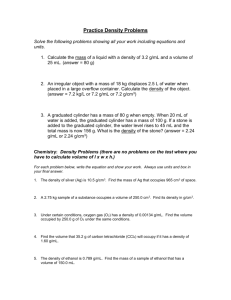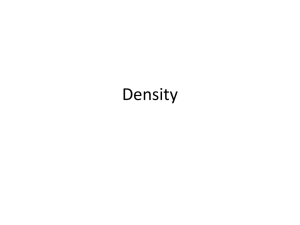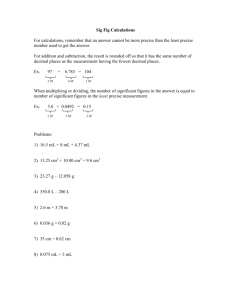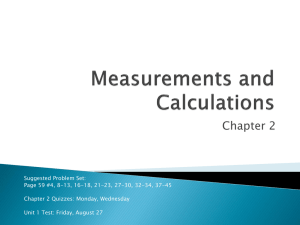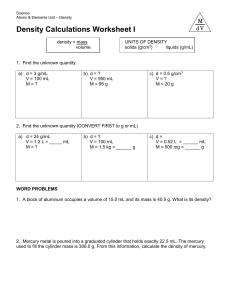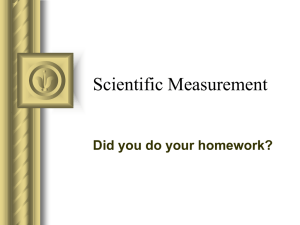Chemistry: Density Problems
advertisement
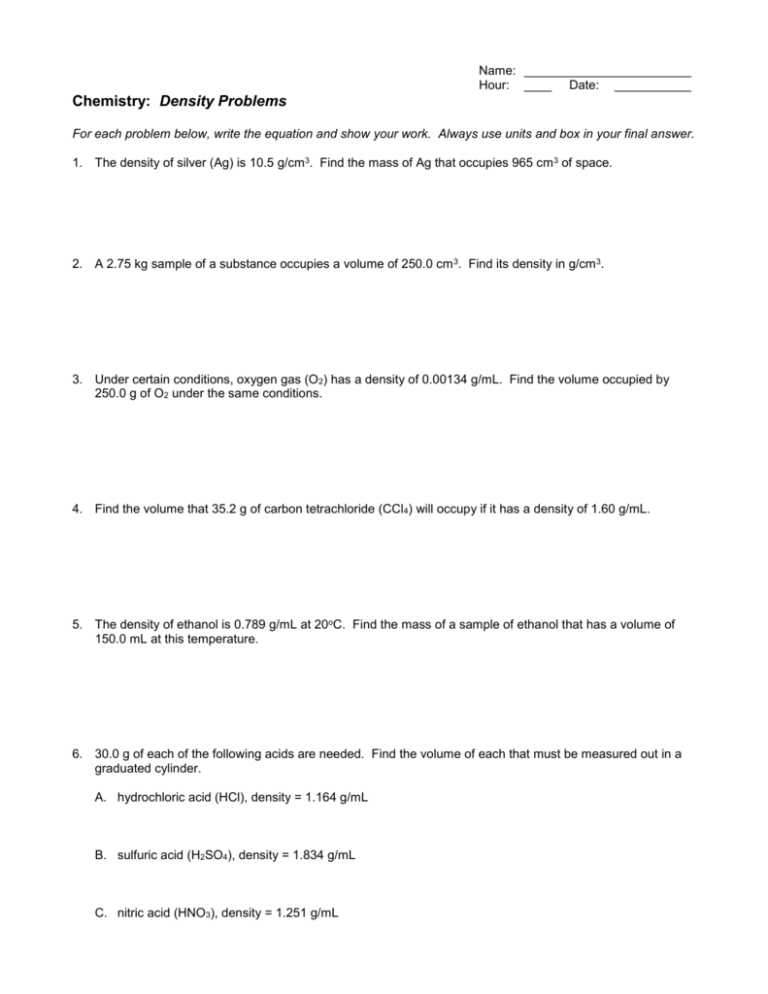
Name: ________________________ Hour: ____ Date: ___________ Chemistry: Density Problems For each problem below, write the equation and show your work. Always use units and box in your final answer. 1. The density of silver (Ag) is 10.5 g/cm3. Find the mass of Ag that occupies 965 cm 3 of space. 2. A 2.75 kg sample of a substance occupies a volume of 250.0 cm 3. Find its density in g/cm 3. 3. Under certain conditions, oxygen gas (O2) has a density of 0.00134 g/mL. Find the volume occupied by 250.0 g of O2 under the same conditions. 4. Find the volume that 35.2 g of carbon tetrachloride (CCl4) will occupy if it has a density of 1.60 g/mL. 5. The density of ethanol is 0.789 g/mL at 20oC. Find the mass of a sample of ethanol that has a volume of 150.0 mL at this temperature. 6. 30.0 g of each of the following acids are needed. Find the volume of each that must be measured out in a graduated cylinder. A. hydrochloric acid (HCl), density = 1.164 g/mL B. sulfuric acid (H2SO4), density = 1.834 g/mL C. nitric acid (HNO3), density = 1.251 g/mL 7. A rectangular block of lead (Pb) measures 20.0 mm X 30.0 mm X 45.0 mm. If the density of Pb is 11.34 g/cm3, calculate the mass of the block. 8. A cube of gold (Au) has a side length of 1.55 cm. If the sample is found to have a mass of 71.9 g, find the density of Au. 9. An irregularly-shaped sample of aluminum (Al) is put on a balance and found to have a mass of 43.6 g. The student decides to use the water-displacement method to find the volume. The initial volume reading is 25.5 mL and, after the Al sample is added, the water level has risen to 41.7 mL. Find the density of the Al sample in g/cm3. (Remember: 1 mL = 1 cm 3.) 10. If you are sure that a sample of material is aluminum but have no measuring instruments AND are not allowed to handle the sample, how would you determine the sample’s density? 11. A gas has a mass of 3175 g and takes up enough space to fill a room that is 2.00 m X 2.00 m X 5.00 m. Use the table below, which lists densities in units of g/mL to help you determine what the gas is. (Hint: Change the units on the size of the room.) Densities of Common Gases at 20oC under Normal Atmospheric Pressure Answers: Gas Density (g/mL) Hydrogen 0.000084 Helium 0.000166 Nitrogen 0.001165 Oxygen 0.001331 1. 2. 3. 4. 5. 1.01 x 104 g Ag 11 g/cm3 1.87 x 105 mL 22.0 mL 118.35 g ethanol 6A. 6B. 6C. 7. 8. 25.8 mL HCl 16.4 mL H2SO4 24.0 mL HNO3 306 g Pb 19.3 g/cm3 9. 2.69 g/cm3 11. helium KEY Chemistry: Density Problems For each problem below, write the equation and show your work. Always use units and box in your final answer. 1. The density of silver (Ag) is 10.5 g/cm 3. Find the mass of Ag that occupies 965 cm 3 of space. m D V m (10.5 g/cm 3 ) 965 cm3 m 10133 g 2. A 2.75 kg sample of a substance occupies a volume of 250.0 cm 3. Find its density in g/cm 3. 1000 g 275 0 g x g 2.75 kg 1kg D m V m 2750 g 3 250.0 cm m 11.0 g cm3 3. Under certain conditions, oxygen gas (O2) has a density of 0.00134 g/mL. Find the volume occupied by 250.0 g of O2 under the same conditions. V m D V 250.0 g O 2 0.00134 g mL V 1.87 10 5 mL O 2 4. Find the volume that 35.2 g of carbon tetrachloride (CCl4) will occupy if it has a density of 1.60 g/mL. V m D V 35.2 g CCl 4 1.60 g mL V 22.0 mL CCl 4 5. The density of ethanol is 0.789 g/mL at 20oC. Find the mass of a sample of ethanol that has a volume of 150.0 mL at this temperature. m D V m (0.789 g/mL) 150.0 mL m 118.4 g ethanol 6. 30.0 g of each of the following acids are needed. Find the volume of each that must be measured out in a graduated cylinder. A. hydrochloric acid (HCl), density = 1.164 g/mL V m D V 30.0 g HCl 1.164 g mL V 25.8 mL HCl B. sulfuric acid (H2SO4), density = 1.834 g/mL V m D V 30.0 g H2 SO 4 1.834 g mL V 16.4 mL H2 SO 4 C. nitric acid (HNO3), density = 1.251 g/mL V m D V 30.0 g HNO 3 1.25 g mL V 24.0 mL HNO 3 KEY – Page 2 Chemistry: Density Problems 7. A rectangular block of lead (Pb) measures 20.0 mm X 30.0 mm X 45.0 mm. If the density of Pb is 11.34 g/cm3, calculate the mass of the block. m DV V length width height V length width height g m 11.34 27 cm3 V 45.0 mm 20.0 mm 30.0 mm V 4.5 cm2.0 cm3.0 cm cm3 V 27,000 mm 3 V 27.0 cm3 m 306 g Pb 1 cm 10 mm 1 cm3 10 mm 3 1 cm1 cm1 cm 10 mm 10 mm 10 mm 1 cm3 27 cm3 x cm3 27,000 mm 3 1000 mm 3 1 cm3 1000 mm 3 8. A cube of gold (Au) has a side length of 1.55 cm. If the sample is found to have a mass of 71.9 g, find the density of Au. V l ength width height V 1.55 cm1.55 cm1.55 cm D V 3.72 cm3 m V D 71.9 g D 19.3 3 3.72 cm g cm3 9. An irregularly-shaped sample of aluminum (Al) is put on a balance and found to have a mass of 43.6 g. The student decides to use the water-displacement method to find the volume. The initial volume reading is 25.5 mL and, after the Al sample is added, the water level has risen to 41.7 mL. Find the density of the Al sample in g/cm3. (Remember: 1 mL = 1 cm 3.) 41.7 mL - 25.5 mL 16.2 mL final initial D volume m V D 43.6 g 16.2 mL D 2.69 g mL 10. If you are sure that a sample of material is aluminum but have no measuring instruments AND are not allowed to handle the sample, how would you determine the sample’s density? Look it up in a reference book (or online). 11. A gas has a mass of 3175 g and takes up enough space to fill a room that is 2.00 m X 2.00 m X 5.00 m. Use the table below, which lists densities in units of g/mL to help you determine what the gas is. (Hint: Change the units on the size of the room.) Densities of Common Gases at 20oC under Normal Atmospheric Pressure Gas Density (g/mL) Hydrogen 0.000084 Helium 0.000166 Nitrogen 0.001165 Oxygen 0.001331 V 2.00 m2.00 m 5.00 m V 200 cm200 cm500 cm V 2.00 10 7 cm3 D m V D 3175 g 2.00 10 cm 7 3 D 1.59 10 -4 g cm3 Answers: 1. 2. 3. 4. 5. 1.01 x 104 g Ag 11 g/cm3 1.87 x 105 mL 22.0 mL 118.35 g ethanol 6A. 6B. 6C. 7. 8. 25.8 mL HCl 16.4 mL H2SO4 24.0 mL HNO3 306 g Pb 19.3 g/cm3 9. 2.69 g/cm3 11. helium
